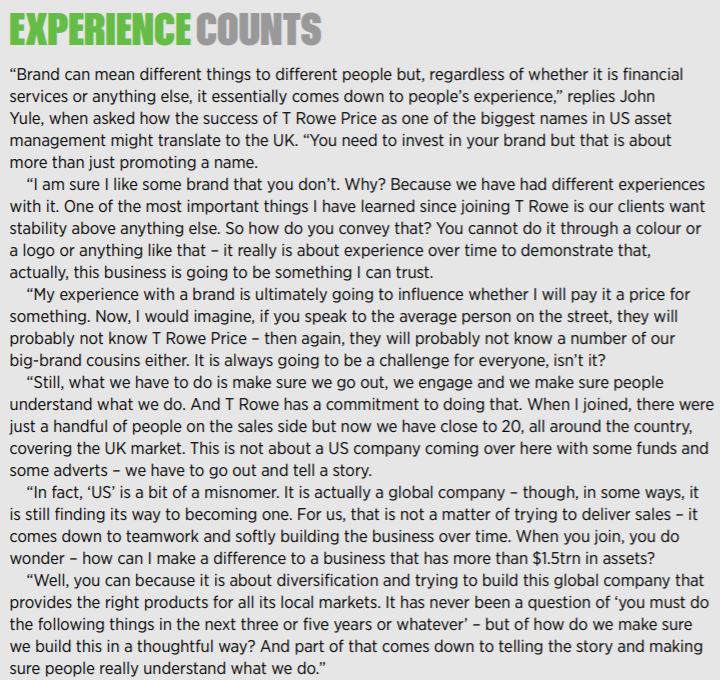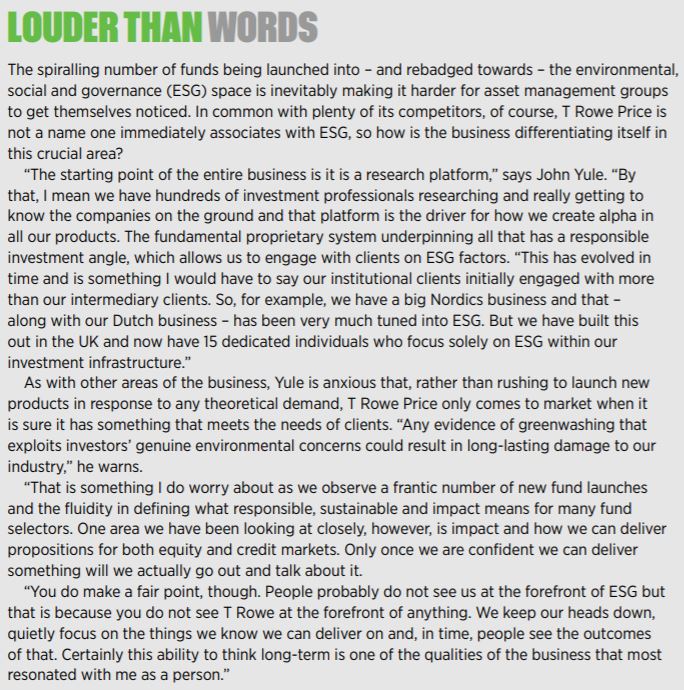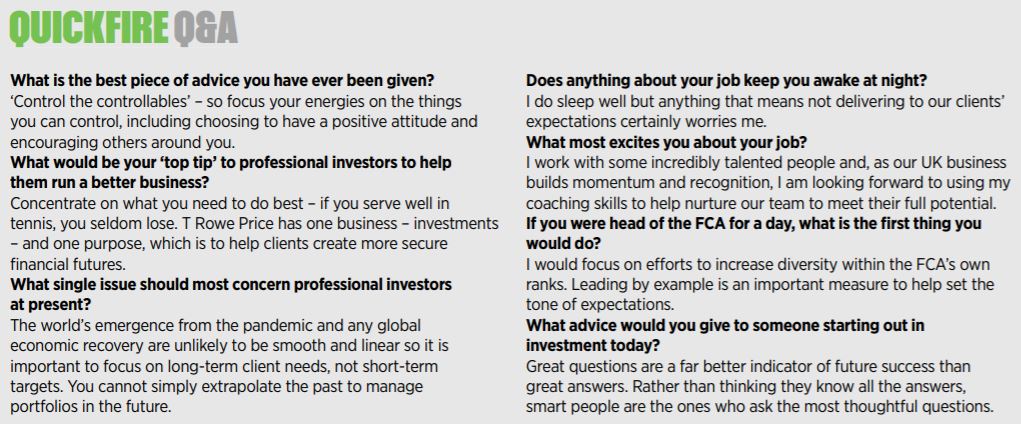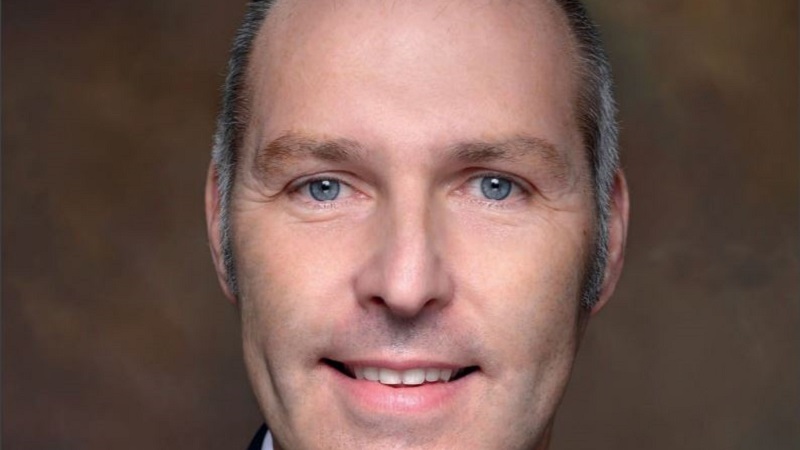Some financial services folk can seem to switch jobs every five minutes. Others, in contrast, appear to stick in the eye of the hurricane while their employers change structure, owner and brand with similar regularity. Firmly in the latter camp is John Yule, who joined Ivory & Sime in 1994 and worked there for 20 years as it was taken over by Friends Provident, briefly branded as ‘Isis’ and eventually merged with F&C Asset Management.
Forgive me if I have missed out an evolution or two – F&C’s purchase of Thames River should probably be in there somewhere – but, either way, Yule’s 2014 move to be T Rowe Price’s head of intermediary relationship management in the UK and Ireland felt all the more significant for his previous steadfastness. So what was it that attracted him to join the US-based asset management giant?
“What really interested me is the story the business has to tell,” replies Yule, who is now head of UK and Ireland at the group. “At the start, I did not know the company that well but, after a fair number of interviews, I realised these were not so much interviews as discussions to help get to know people’s values.
“Through these, it became obvious T Rowe is a business that runs subtly under the radar but is very much focused on clients.
“And, yes, I know everybody says that but one of the crucial points that shone through to me was this is a company with a single purpose – it is an investment business. There are no conflicts to detract from that one aim – T Rowe basically wants to do nothing but focus on investment and so help create more secure financial futures for our clients.”

It is a fine ambition and yet – how to put this politely? – the history of investment can offer one or two examples of big American names that have not always lived up to such aspirations when looking to expand operations across the Atlantic. Yule acknowledges the point before going on to suggest the issue facing T Rowe Price might actually be precisely the opposite – it has not talked enough about its historical commitment to the UK.
As it happens, the company opened its first London office in … actually, why don’t you have a guess when it opened its first London office? No, don’t cheat by skipping ahead – pick a year or even a decade. Ready? OK, well done if you went for the 1970s and a bonus point if you chose 1979. “I am still hearing we are pretty late to the game as an asset manager in the UK market but we have been operating here for 40 years,” says Yule.
“It is just that we have not always gone out and told people. Clearly, when I joined, we had a London presence as well as number of other European offices but it is understandable enough if people have this idea of ‘another overseas asset manager coming to the UK marketplace’ and then start wondering how committed we are. They do that because they do not know enough about us.”
Global presence
T Rowe Price, then, was founded in 1937 by the eponymous Thomas Rowe Price Jr and, while it may be US-listed and headquartered in Baltimore, Maryland, it could more reasonably be described as a global business. In 16 offices around the world, hundreds of equity, fixed income and research professional analyse companies and, collectively, are responsible for some $1.6trn (£1.16trn) of assets worldwide.
“Naturally we have a big presence in the US but we manage money for different markets in different parts of the world – for example, our Japanese equity funds are managed out of Tokyo and our Australian equity funds are managed in Australia,” says Yule. “The key for me, of course, is we have more than 500 people based in our London office.
“Many of these are local people with local market knowledge but there are a lot of global managers as well – for instance, the global fixed income franchise has a very large base in London and we manage European equities and some of our emerging markets money here too. So there is an infrastructure and a story to tell about T Rowe in the UK but, to be honest with you, why would anybody know it unless we go and speak to them about it?
“This has been a great opportunity for me personally, to start talking about the business and its culture. Take ESG, as an example. Obviously it has strong foundations in the institutional market and first came to us largely through our Nordic offices, but it is clearly now important to all kinds of investors across the UK and the rest of Europe, who will focus more and more on responsibility and impact.
“What is more, key aspects of ESG investing – engagement, looking to get close to companies and to have some real impact – can play very well for active managers. In time, I think ESG considerations will lead to more money going into active management than is perhaps currently expected and a bit less going into passive, which in turn should play very well to the culture at T Rowe.
“We are really interested in engaging with companies to know them better and understand how they can change – on ESG and, by extension, diversity, equity and inclusion. Issues around racial injustice and social inequality, for example, mean investors and other stakeholders must now work hard to try and understand businesses’ values. If companies do not think hard about what they are doing here, their value will erode over time.”

Strength and stability
T Rowe Price has been a listed business since it floated in 1986 and, argues Yule, the resulting ownership structure has only enhanced its reputation for solidity. “There is no hiding place when you are a listed business,” he continues. “We are transparent, we have a large staff ownership and you see our leaders regularly. Our strength and stability is appreciated by investors in the business as well as by clients.
“The company has grown organically over the past 80 or so years because it has stuck to its knitting, adhering to the principles of the founder all that time. We are always hearing questions about when T Rowe might make an acquisition but certainly, listening to my superiors, the feeling is very much that we know and trust our culture, we know it works and we know it delivers for our clients.
“That is not to say we do not keep an eye on mergers and acquisitions but that is because it is always interesting to see what our competitors are doing. Also, M&A tends to create disruption, which can play into our hands a bit. If other businesses need to merge in the hunt for scale or better performance, that is fine. For us, of course, it creates fewer competitors and more opportunities to go out and speak about our business.”
Yule also highlights the financial strength of the company, adding: “T Rowe has a strong balance sheet, with no long-term debt and significant cash reserves. Even during difficult periods such as the past few years, however, it is not afraid to invest in the business – for example, some of our technological infrastructure needs to be upgraded on a constant basis, which has proved a differentiator for us over time.
“If you want be a global company, you have to make sure you can deliver in a very complex world – which for us, for example, involves Oeics in the UK, Sicavs in Europe, mutual funds in the US, unit trusts in Australia and more. Each local market adds layers of complexity that we need to think about actually delivering on. Technology expenditure cannot be a one-off spend – it is just ongoing.”
On the other side of the, well, coin, how is T Rowe Price working to deliver value for money to its clients in what is becoming an ever-more competitive environment? “Value for money is not just about price – it is also about brand and the way you do business,” Yule replies. “Ultimately, people should be able to take comfort from the robust approach we take to look to ensure we invest appropriately over the medium to long term.
“That said, we do take actions that may go unnoticed – for example, managing the capacity in some funds where it might otherwise be detrimental to alpha. We also cap fees on smaller funds to make sure the charges are not onerous and, as I say, we invest in technology and other parts of the business that sit at the heart of building investment performance.”
Service game
Service is another key factor in the value-for-money equation and, no pun obviously intended, Yule uses a tennis analogy to underline that, if a company starts well, good results should follow. “If you serve well in a match, then generally you are going to do well in terms of the outcome,” he says. “Ultimately, if you want to build something that creates value, you first need to try and envisage the outcome you want.
“It is only natural that people will bring price into any conversation about value for money but the reality is that perceptions about value tend to form towards the end of the journey, when someone thinks ‘this experience has been great’ or maybe ‘it has not met my expectations’. Obviously, as an asset manager, you have to charge a reasonable price but you also have to offer products and strategies people are confident about investing in.”
Ultimately, for Yule, T Rowe Price’s commitment to the UK – and to clients in general – comes down to “presence, building trust and working hard to engage with the parts of the market that don’t know us”. “Some people might initially be hesitant because they have strong legacy relationships elsewhere, while others become really interested when they start hearing about us and our culture and how we want to deal with them,” he adds.
“You could argue we are a pretty vanilla, long-only, active asset manager but that is what we do well – and sharing our experience from the US is something that can resonate with clients. “There is no one-size-fits-all approach that works across all clients but, in the end, a lot of it comes down to quality of communication – if people are going to trust us with their money, they need to understand what we do.
“So we need to send out credible messages that resonate well with clients and make sure they know what they should expect from us, that we will deliver it over the long term and, importantly, that we will keep reporting to them so they know we continue to do what we have told them.
“It may sound basic but it bears repeating – you have to be transparent, you have to be patient and, in the end, you have to do what you say you will.”

This article is taken from the July/August 2021 issue of Portfolio Adviser magazine. Read more here.










